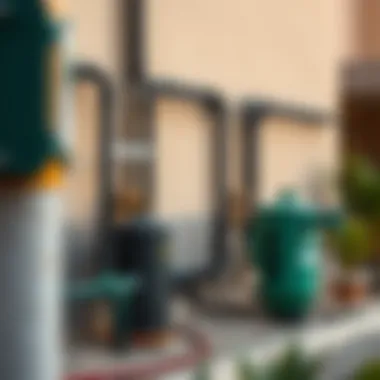Understanding Dewa Gas Connection Charges in Dubai


Intro
In the vast landscape of Dubai's real estate market, comprehending the subtleties of utility connections is paramount. Among these, Dewa gas connection charges stand out, impacting both residential and commercial properties more than one might initially surmise. It's not merely about signing up for gas services; it's about understanding the charges associated with them, the structural components of these fees, and their implications for investors and prospective residents alike.
Navigating through Dewa's fees can be a minefield of confusion. This article will shed light on the Dewa gas connection charges, breaking down the fees into digestible segments while providing insights on payment processes and the intricacies involved. Whether you're an investor eyeing property in Dubai or a resident wanting to understand future expenses, this guide will equip you with the necessary knowledge to make decisions with confidence.
From understanding how these connections fit into the broader Dubai utility framework to unlocking practical tips for applying, this article seeks to clarify what might seem like a daunting maze. Prepare to delve into the details that matter and learn how to navigate this essential part of property ownership in Dubai.
Prelude to Dewa Gas Connections
Understanding the landscape of gas connections in Dubai is vital for anyone looking to settle in or invest in this dynamic city. The Dubai Electricity and Water Authority (DEWA) plays a pivotal role in ensuring a reliable supply of energy, and gas connections are an integral part of this framework. With the increasing number of residents and businesses, the demand for gas services has surged, making it essential to comprehend the associated charges and procedures that come into play.
Gas connections facilitate not just cooking and heating but extend to energy appliances that maximize comfort and efficiency in homes and offices. Understanding these connections involves diving into the intricate structure of charges that DEWA imposes, as well as the various components that contribute to these costs.
Overview of Dewa's Role in Energy Distribution
DEWA stands at the forefront of energy distribution in Dubai, managing both electricity and water supply alongside natural gas. This integrated approach ensures that residents have access to essential utilities seamlessly. The authority’s meticulous planning and infrastructure development support the rapid growth of the city and its economy.
Through a vast network of pipelines and distribution centers, DEWA guarantees that energy, including natural gas, is delivered in a safe and efficient manner. Their regulatory role not only maintains service quality but also adapts to the ever-evolving demands of a burgeoning population. As Dubai continues to expand, DEWA’s role becomes increasingly critical, necessitating an understanding of how gas connections function within this framework.
Importance of Gas Connections for Residents
For residents, securing a gas connection is often a foundational step in making a house a home. These connections are not solely about convenience; they have broader implications on cost savings and sustainability. Using gas as an energy source can often lead to lower utility bills compared to electricity-powered options, particularly for cooking and heating purposes.
Moreover, a stable gas supply significantly influences the quality of life. It empowers homeowners to leverage a wide range of gas-powered appliances that enhance daily living experiences. From efficient ovens to reliable water heaters, having access to natural gas means residents can enjoy greater autonomy over their living environments.
With the right understanding of the gas connection process, one can navigate the journey from application to installation more effectively. This knowledge serves as a tool for future-oriented decision-making, especially for those considering property investments in Dubai’s vibrant real estate market. Ultimately, these connections symbolize more than just a utility service; they represent a commitment to enhancing the quality of living in a rapidly advancing metropolis.
Understanding Gas Connection Charges
Understanding gas connection charges is crucial for anyone looking to settle or invest in Dubai's intricate real estate landscape. These costs are not merely administrative fees; they reflect the underlying infrastructure and regulatory framework of the gas distribution system. By familiarizing ourselves with these charges, we are better equipped to navigate the complexities of setting up a gas connection, ensuring that we don’t run into unexpected costs or delays down the line.
It’s essential to grasp not only the direct fees associated with gas connections but also the hidden implications they may carry for property investments. A deep understanding of these charges can aid in informed budgeting, planning, and ultimately, decision-making for both residents and investors.
What Constitutes Gas Connection Charges?
Gas connection charges encompass various fees that are directly tied to the process and infrastructure involved in establishing a gas service for a property. Here’s a breakdown of the typical components:
- Application fee: A nominal charge for processing the application for the gas connection.
- Connection fee: This fee is central to what you pay to physically connect your property to the Dewa gas pipeline.
- Meter installation charge: This accounts for the equipment necessary to measure gas consumption effectively and accurately.
- Inspection fees: Dewa may charge for the inspections required to meet safety and regulatory standards prior to commencing service.
Understanding these elements is pivotal. Failing to factor in these charges may lead to financial strain when setting up gas services, especially for newcomers who might be caught off guard by the cumulative costs.
Differentiating Between Installation and Connection Fees
When discussing gas charges, it’s crucial to separate installation fees from connection fees. These two aspects, while often mentioned together, serve different purposes and therefore involve different financial considerations.
- Installation fees refer to the costs incurred for setting up the gas-related infrastructure within your property. This includes the labor and materials required for ensuring your system is operational and safe. These charges vary significantly based on the complexity of the installation. For example, a standard residential setup might incur lower fees compared to a more complicated installation involving multiple gas appliances.
- Connection fees, on the other hand, are tied to linking your property with the existing gas supply network. This may encompass a one-time charge paid to Dewa for the service of creating and activating a connection point.
Recognizing this distinction can help prevent misunderstandings when budgeting for utility costs and planning for future upgrades or renovations that may affect gas services.
Factors Influencing Dewa Gas Connection Charges
Understanding the elements that influence Dewa gas connection charges is crucial for anyone looking to navigate the complexities of utility costs in Dubai. This section delves into how factors such as property type and location, along with infrastructure, play significant roles in determining the charges assessed for gas connections. This knowledge can enable prospective residents and investors to make informed decisions about energy needs and financial planning.
Property Type and Location Considerations


The type of property greatly influences Dewa gas connection charges. For instance, a standalone villa typically incurs different charges compared to an apartment in a large residential complex. This variance arises from varying infrastructures, total gas consumption, and connection requirements. Moreover, the monetary implications don't rest solely with the property type; the location within Dubai also matters.
For example, properties in bustling areas like Downtown Dubai may face higher connection costs due to the underlying infrastructure maintenance and demand for services. Conversely, properties set in less densely populated regions might see lower connection costs. Here, the equation is straightforward: a higher density usually means greater demand, and that can translate into higher charges. The local regulations and associated taxes may also vary based on the municipality, adding another layer of complexity.
- For residential buildings, the overall number of units can impact the scaling of charges.
- Commercial properties, given their larger gas demands, might be subject to different billing structures that reflect their energy usage.
As a resident or investor, understanding these nuances not only assists in budgeting but can be the difference between a smooth integration into Dubai’s vibrant community or facing unexpected financial hurdles.
The Role of Infrastructure in Charge Variables
Infrastructure is a critical factor that directly influences Dewa gas connection charges. The state of existing pipelines, the distance from main supply lines, and the overall layout of the energy distribution network can shape the costs associated with connecting a new property to the gas supply. In densely populated areas, the infrastructure is often more developed; however, this also comes with higher demand and, subsequently, costs.
Another point worth considering is whether the property is situated in a newly developed area or an established neighborhood. New developments may require additional infrastructure investments, leading to increased connection fees. Furthermore, any additional works necessary to ensure safety and compliance can also contribute to the final cost.
"Investors should look beyond just the surface cost of a connection; considering the underlying infrastructure and future implications is equally key."
- If the gas supply needs to be routed through existing pathways or if major construction is needed, expect to see that reflected in the charges.
- Regular maintenance and potential upgrades to the gas distribution network can also cause fluctuations in connection charges over time.
In summary, by appreciating how property type and infrastructure can influence Dewa gas connection charges, residents and investors in Dubai can better strategize their engagements with utility services, thereby easing any associated financial strain.
The Gas Connection Application Process
When it comes to connecting to Dewa's natural gas services, understanding the gas connection application process is crucial. This path not only ensures a seamless transition to utilizing gas in your home or commercial space, but it also saves you from potential headaches down the road. Navigating the ins and outs of the process aligns closely with your broader goals—be it comfort for your family or efficiency in a workplace.
Initial Documentation Required
Before you dive into the application, assembling the necessary documentation is an essential step to avoid delays. The documents often sought by Dewa include:
- Valid identification: This can be a passport or Emirates ID, which verifies your identity.
- Proof of property ownership or lease: A title deed or lease agreement helps establish your rights over the property.
- No Objection Certificate (NOC): This may be required from the property developer or the landlord, ensuring there are no restrictions on installing gas.
Having all these documents at your fingertips not only speeds up the process but also puts your mind at ease knowing you’re ready for what lies ahead. If you miss any key documents, it’s like showing up to a party and realizing you forgot the invitation.
Step-by-Step Guide to Applying for Connection
Now that you're equipped with the necessary paperwork, let’s walk through the application process. Here’s a step-by-step guide:
- Visit the Dewa website or local branch: This is where you will find the specific forms needed.
- Fill out the application form: Be sure to include all relevant details accurately. This is your first chance to make a good impression.
- Submit documentation: Attach all required documents as specified. Remember, incomplete applications lead to delays.
- Await confirmation from Dewa: Generally, you will receive a confirmation regarding your application within a few days.
- Schedule an inspection: Once your application is approved, Dewa will arrange to inspect the property.
- Installation scheduling: Following inspection, you’ll set a date for the actual installation of the gas connection.
By following each step diligently, you’ll find the road to gas connection smoother than a well-oiled machine.
Timeline for Application Processing
How long does it take to go from application to actual gas connection? The timeline can vary based on a few factors, but here’s a general idea:
- Application review: Typically takes about 3-5 business days.
- Inspection of the premises: This will usually happen within a week of application approval.
- Installation: After the inspection is cleared, you can expect the installation to occur within another week or two, provided there are no unexpected hiccups.
Thus, the entire process can take anywhere from 2 to 4 weeks. It's worth noting that proactive communication with Dewa can help speed things up, especially if you stay on top of required actions.
"Effective communication is the key to unlocking a smoother process and a faster gas connection."
In summary, keeping your documentation organized and following each step closely will greatly improve your experience during the gas connection application process. Being informed and prepared is half the battle in securing the essential services you need in Dubai.
Payment Procedures for Gas Connection Charges
Understanding payment procedures for gas connection charges is crucial for both new residents and property investors in Dubai. Proper knowledge in this area not only simplifies the financial aspect of acquiring a gas connection, but also enhances overall satisfaction with utility services. Navigating the payment system can be perplexing if one isn’t well-informed. Hence, grasping the options available and adhering to the right schedules is essential for avoiding unforeseen inconveniences down the road.


Methods of Payment Available
When it comes to paying for gas connection charges, Dewa offers several convenient methods to cater to the diverse needs of residents and businesses. Here’s a breakdown of the most common payment methods:
- Online Payment: The easiest way for many is through Dewa’s official website or mobile app. Users can log in to their accounts and settle charges directly, using various payment methods like credit cards or bank transfers.
- Bank Transfers: Direct transfers from local banks are also accepted. Residents can use channels like the Dubai Islamic Bank or Emirates NBD to pay the dues. This might appeal to those who prefer handling transactions directly with their bank.
- Payment Kiosks: These self-service kiosks can be found in various locations around Dubai. They're user-friendly and provide a hands-on experience for those who wish to pay in cash.
- Customer Service Centers: For those who prefer face-to-face interactions, visiting a Dewa customer service center remains a viable option. Here, representatives can assist with payments and address any queries.
Each of these methods presents various benefits, ensuring that customers can pick what fits them best.
Understanding the Payment Schedule
Once the methods of payment are clear, understanding the payment schedule becomes critical. Knowing when to pay and how often helps in organizing financial commitments efficiently. Typically, gas connection charges are billed on a monthly basis, in conjunction with other utility charges. However, it’s important to keep an eye on these timelines.
Here are a few key points to note regarding the payment schedule:
- Billing Cycle: Dewa usually issues monthly statements. These can be accessed online, allowing residents to manage their payments better.
- Due Date: Payments generally have a strict due date, which is often a week after the billing statement is generated. Missing this date can incur late fees or service interruptions, hence it’s wise to set reminders.
- Payment Flexibility: Upon speaking with Dewa representatives, certain customers may explore options for deferred payments in cases of financial strain.
In summary, familiarizing oneself with the methods of payment and adhering to the outlined schedule is vital. It not only streamlines convenience but helps in maintaining a good standing with utility providers.
"Understanding the payment processes ensures that residents can concentrate on enjoying their homes without the stress of utility issues."
For more information on gas connections, visit Dewa's official site or access resources on Dubai government utilities.
By staying informed and prepared, investors, agents, and buyers can make educated decisions regarding their gas connection needs.
Common Challenges in Securing Gas Connections
Securing a gas connection through Dewa can sometimes feel like navigating a maze filled with bureaucratic red tape and unexpected expenses. Understanding these challenges can save residents a great deal of time, frustration, and money. In this section, we will delve into the two key areas that often present hurdles: delays and administrative issues, as well as the unforeseen costs that may come as a shock to new residents.
Delays and Administrative Hurdles
When it comes to getting connected to the gas network, one of the primary challenges many applicants encounter is delays. These can arise from several factors related to the processing of applications. Applicants often find themselves waiting longer than expected, with timelines stretching from a few weeks to several months.
Potential causes for delays include:
- Incomplete Documentation: If required documents are missing or improperly filled out, the application can be set back considerably. It's essential to double-check everything is in order before submission.
- Approval Bottlenecks: Even once documentation is submitted, approvals might be slow due to internal administrative processes at Dewa, causing frustration for applicants eager to get their supply set up.
- Site Inspections: In some cases, a physical inspection of the installation site is mandated before a gas connection can be granted. These inspections themselves can be subject to scheduling delays.
Residents should be prepared for these potential bottlenecks and consider planning for a longer-than-anticipated wait period. (Keeping your phone handy for follow-ups and checking in on the status of your application can be a helpful tactic.)
"Being well-prepared can often mean the difference between smooth sailing and being stuck in a slow lane."
Costs That May Catch New Residents Off Guard
Alongside delays, financial factors can also pose challenges in securing a gas connection. New residents might think they have calculated the costs but could discover unexpected charges.
Common unexpected costs include:
- High Installation Fees: Many might underestimate the fees associated with installing the necessary infrastructure, particularly if their property requires significant alterations.
- Infrastructure Upgrades: If you live in a newly developed area where infrastructure is not yet in place, the cost of adding gas lines to your neighborhood can be significant and might be passed on to the homeowner.
- Connection Charges Not Initially Disclosed: Sometimes, other fees are outlined in the fine print of contracts that residents may overlook. This can include fees for specialized equipment or permitting during installation.
Advice for New Residents: It's advisable for potential gas connection applicants to have a detailed conversation with Dewa representatives about all fees associated with obtaining gas connections. Requesting a complete breakdown of costs beforehand can mitigate the surprises later.
In summary, while setting up a gas connection might seem straightforward, there are common challenges that can complicate the process. Recognizing these hurdles allows applicants to be better prepared, ensuring a smoother transition into their new home.
Comparative Analysis of Utility Connection Costs in Dubai
When diving into the world of utilities in Dubai, comprehending the connection costs can feel akin to navigating a minefield—each step could lead to unwelcome surprises. It’s essential to unpack the costs associated with utility connections, as they play a vital role in budgeting for new residents and investors. Both gas and electricity connection charges form the backbone of this discussion, as understanding how they stack against one another is critical for informed decision-making.


Gas vs. Electricity Connection Costs
When comparing the costs of connecting gas and electricity, several factors come into play:
- Installation Fees: Both gas and electricity have upfront installation fees, often influenced by the type of property and its location. However, gas installations often involve additional plumbing work, which can raise costs.
- Ongoing Charges: Monthly billing practices for both utilities can vary. Gas tends to present a more consistent rate, while electricity may fluctuate based on usage and demand.
- Initial Outlay vs. Long-Term Costs: While the initial connection fee for gas may be higher, some residents find that gas can lead to savings over time due to its efficiency in heating and cooking.
It's important to highlight this initial discrepancy. A prospective homeowner might pay, say, AED 1,500 for a gas connection, whereas an electric setup could run AED 1,000. However, running a gas stove could result in lower bills compared to electric options, where rates can vary drastically based on consumption. In a city where utility rates change, understanding the long-term implications becomes paramount.
Understanding Additional Costs Related to Utilities
Aside from the straightforward connection costs, it’s crucial to examine additional expenses that often accompany utility setups; these can sneak up on newcomers. Among these extras:
- Permit and Inspection Fees: In Dubai, securing the necessary permits can add to the overall cost, particularly if modifications to existing installations are required. Each additional inspection can incur its own fee.
- Equipment Charges: For gas specifically, there might be charges for the meters or additional appliances required, which could range in price. Not all property types require the same appliances, so understanding these variations is key.
- Maintenance Costs: Future maintenance of both gas and electrical systems can differ significantly. Understanding what each type of utility requires in terms of long-term upkeep can sway a buyer's decision greatly.
In the grand scheme of things, all these costs contribute to the total picture of living expenses in Dubai. By taking the time to fully understand the nuances between gas and electricity connection costs—alongside the hidden fees—it's possible for potential residents to make choices that best suit their financial landscape. As such, prospective investors and new residents should approach the utility setup process with a discerning eye.
"The devil's in the details" seems like a fitting saying here. Those who neglect to consider these hidden costs may find themselves in a tight spot further down the road.
Impact of Regulatory Changes on Dewa Gas Charges
Regulatory changes can significantly shape the landscape of utility charges, including Dewa's gas connection fees. In a city like Dubai, where energy consumption is constantly on the rise due to rapid urbanization and a booming expatriate population, understanding the implications of these changes is crucial for both residents and investors.
Policies crafted by regulatory bodies tend to directly influence financial commitments for gas connections. This can involve both a sudden increase or a decrease of fees, depending on factors like infrastructure developments, energy sourcing, and sustainability mandates. Keeping an eye on these trends can help prospective consumers anticipate adjustments in their gas budgets and plan accordingly.
Recent Revisions in Policies and Regulations
In recent years, several noteworthy revisions have been flagged in the energy regulations applicable to DEWA gas connections. The Dubai Electricity and Water Authority has prioritized enhancing energy efficiency and environmental sustainability, leading to some adjustments that impact connection charges.
- Introduction of New Tariffs: Recent policy updates include new tariff structures that aim at encouraging residents to adopt greener practices. For instance, tiered pricing can make lower consumption more enticing.
- Streamlined Approval Process: Policies have also been revised to make the application process more efficient, thereby reducing waiting times for connection.
- Incentives for Sustainability: There are now incentives for residents who opt for energy-efficient appliances during the installation of their gas connections. This can potentially lower the overall charges, creating a win-win situation for both the authority and consumers.
These updates reflect DEWA's commitment to fostering a sustainable energy environment while also addressing consumer concerns regarding costs and efficiency.
Future Trends in Gas Connection Pricing
As Dubai continues to evolve, several future trends are emerging regarding gas connection pricing:
- Dynamic Pricing Models: There may be a shift towards dynamic pricing models that allow charges to fluctuate based on time of use. This can incentivize off-peak usage and reduce peak load.
- Focus on Renewable Energy Sources: With ongoing shifts towards renewable energy, gas connection pricing may increasingly incorporate charges related to the carbon footprint of gas supplies, further driving down the prices for cleaner options.
- Greater Transparency and Responsiveness: Future regulations are expected to emphasize transparency in pricing structures, allowing consumers to have better insights and knowledge, which could enhance competition among providers.
In summary, understanding regulatory changes is crucial in deciphering the nuances behind Dewa gas connection charges. With revising policies geared towards sustainability and efficiency, it becomes even more essential for residents and investors to stay informed—and prepared—when engaging with these connection fees.
Understanding regulations in context is fundamental for managing utility connection costs effectively.
Closure and Recommendations
In wrapping up this examination of Dewa gas connection charges, it becomes evident that understanding this topic is crucial for anyone navigating the property market in Dubai. The complexities of charging structures, combined with the associated processes, can often leave potential investors feeling lost in a maze of bureaucracy. This section aims to clarify those elements that truly matter as you take the plunge into securing a gas connection.
Key Insights: Understanding Dewa's pricing can facilitate better budget planning for both residents and investors. Furthermore, staying informed about any regulatory changes ensures you aren’t caught off guard by unexpected charges. These factors alone underscore the importance of grasping the entirety of Dewa's gas connection charges.
“Knowledge is power, particularly when it comes to navigating the intricate world of utility charges.”
Summing Up the Key Takeaways
When looking back at the intricacies explored in this article, the following points emerge as critical takeaways:
- Charge Structure: Understanding how Dewa structures its gas connection charges helps you anticipate expected expenditure.
- Application Process: Familiarity with the application process significantly reduces delays. Proper documentation is key here.
- Future Price Trends: Regulatory changes can influence charges in the long run. Keeping an eye on these changes can save you money.
- Comparison with Other Utilities: Knowing how gas connection charges compare with electricity and water connections can help in making more informed decisions about property investments.
These points not only highlight what matters most in securing a gas connection but also provide a foundation on which potential residents can build their financial plans.
Advising Prospective Residents on Best Practices
For those looking to secure a Dewa gas connection, here are some best practices that could enhance your experience:
- Do Your Homework: Familiarize yourself with Dewa's policies and charging structures prior to applying. Their official website is a goldmine of information.
- Submit Complete Documentation: Ensure all required documents are submitted. Missing paperwork can lead to delays and additional costs.
- Budget for Extras: Always allocate some funds for unexpected expenses that might arise during the installation process.
- Stay Updated on Regulations: Keep abreast of new policies or regulations that might affect your charges to avoid surprises later.
- Consult with Professionals: Engaging with property managers or real estate agents who understand the intricacies of the local market can provide invaluable insights.











